ACCNU is a leading provider of integrated ERP (Enterprise Resource Planning) and CRM (Customer Relationship Management) solutions. With a proven track record of excellence, ACCNU specializes in delivering comprehensive software systems that streamline business operations and enhance customer engagement.
Don't wanna be here? Send us removal request.
Text
Empower Your Team with Mobile-First Best ERP Solutions | Accnu
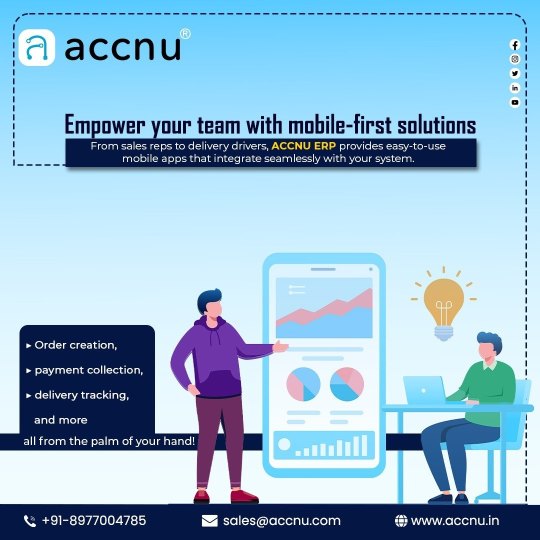
Accnu ERP, the best ERP solution provider, offers mobile-first ERP services and solutions that streamline order creation, payment collection, and delivery tracking—all from the palm of your hand. As a leading ERP solution provider and trusted ERP partner, Accnu delivers seamless ERP solutions and services tailored to your needs. Our cloud-based ERP software enables sales reps, delivery drivers, and teams to work efficiently with user-friendly mobile apps. Partner with Accnu, the #1 cloud-based ERP system and services provider, for a smarter and more connected business experience.
https://accnu.in/
#BestERPSolution#ERPSolutionProvider#ERPPartner#ERPSolutions#ERPServices#LeadingERPSolutionProvider#1CloudbasedERPSoftware#1CloudbasedERPSystem#ERPServicesandSolutions#ERPServicesprovider#BestERPSolutionprovider#BestERPPartner#BestERPservicesprovider
0 notes
Text
Overcome Biggest Challenges with the Best ERP Solution | Accnu

Scaling your business comes with challenges like managing sales orders, inventory management, payment collection, and data security. Accnu ERP offers the best ERP solution to streamline operations and enhance growth. As a leading ERP solution provider, we deliver cloud-based ERP systems and services tailored to your needs. Partner with the #1 cloud-based ERP software to simplify your processes, improve efficiency, and overcome scaling barriers. Discover how the best ERP services provider can help you scale seamlessly. Contact Accnu ERP today!
https://accnu.in/
#BestERPSolution#ERPSolutionProvider#ERPPartner#ERPSolutions#ERPServices#LeadingERPSolutionProvider#1CloudbasedERPSoftware#1CloudbasedERPSystem#ERPServicesandSolutions#ERPServicesprovider#BestERPSolutionprovider#BestERPPartner#BestERPservicesprovider
0 notes
Text
Transform Visions into Reality with Best ERP Solution Provider | Accnu
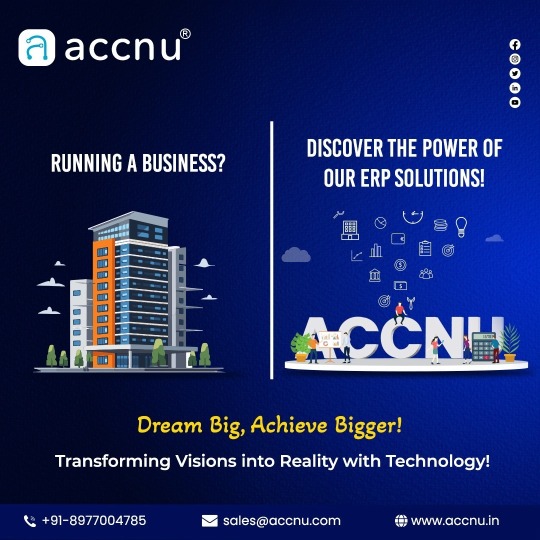
Looking for the Best ERP Solution to transform your business? Accnu, the #1 Cloud-Based ERP Software provider, delivers comprehensive ERP Solutions to streamline operations and drive growth. As a Leading ERP Solution Provider and trusted ERP Partner, we specialize in offering tailored ERP Services and Solutions for businesses of all sizes. From advanced data integration to inventory management, our ERP Services are designed to boost efficiency. Partner with the #1 Cloud-Based ERP System and experience the benefits of working with the Best ERP Solution Provider and Best ERP Services Provider. Contact Accnu, your go-to ERP Partner, today at +91-8977004785, email [email protected], or visit www.accnu.in to learn more.
https://accnu.in/
#BestERPSolution#ERPSolutionProvider#ERPPartner#ERPSolutions#ERPServices#LeadingERPSolutionProvider#1CloudbasedERPSoftware#1CloudbasedERPSystem#ERPServicesandSolutions#ERPServicesprovider#BestERPSolutionprovider#BestERPPartner#BestERPservicesprovider
0 notes
Text
Time Tracking in ERP: Boosting Productivity and Accountability

In today’s fast-paced business environment, effective time management is critical for maximizing productivity and ensuring accountability among employees. As companies seek to optimize their operations, many are turning to Enterprise Resource Planning (ERP) systems to streamline their time-tracking processes. This blog explores the significance of time tracking in ERP, its technical aspects, best practices, and how it can enhance productivity and accountability across an organization.
Understanding Time Tracking in ERP
Time tracking refers to the process of recording and analyzing the time employees spend on various tasks and projects. Integrating time tracking into an ERP system allows organizations to monitor labor costs, project timelines, and employee performance more effectively. ERP systems provide a centralized platform for collecting and analyzing time-related data, making it easier for businesses to allocate resources and assess project profitability.
Importance of Time Tracking in ERP
Accurate Labor Costing: Time tracking enables organizations to calculate labor costs accurately by recording the actual time employees spend on different tasks. This data is essential for budgeting, forecasting, and understanding the true cost of projects.
Enhanced Project Management: By tracking time spent on specific projects, organizations can evaluate progress against timelines, identify bottlenecks, and make data-driven decisions to keep projects on track.
Improved Productivity: With accurate time tracking, organizations can identify areas where employees may be spending excessive time on non-essential tasks. This insight allows managers to implement strategies that boost productivity, such as reallocating resources or optimizing workflows.
Greater Accountability: Time tracking fosters accountability among employees by providing clear records of time spent on various activities. This transparency can lead to improved performance and morale, as employees see the impact of their efforts on overall organizational goals.
Better Resource Allocation: By analyzing time data, organizations can allocate resources more effectively, ensuring that projects have the necessary manpower to succeed. This helps avoid overstaffing or understaffing issues.
Compliance and Reporting: Accurate time tracking is essential for compliance with labor laws and regulations. ERP systems can generate reports that ensure adherence to labor standards, making audits and compliance processes more manageable.
For more details read our blog
#Best ERP Solution#ERP Solution Provider#ERP Partner#ERP Solutions#ERP Services#Leading ERP Solution Provider#1 Cloud based ERP Software#1 Cloud based ERP System#ERP Services and Solutions#ERP Services provider#Best ERP Solution provider#Best ERP Partner#Best ERP services provider#Leading SAP Solutions Provider#SAP Solutions provider#Best ERP solutions#Best ERP solutions provider#Certified SAP Solutions Provider#Trusted SAP Solutions Provider
0 notes
Text
Managing Multiple Companies within a Single ERP System

In today’s competitive business landscape, many organizations operate multiple companies or divisions under a single corporate umbrella. Managing these distinct entities efficiently requires sophisticated solutions that can handle the complexities of varying operations, regulations, and reporting needs. This is where a robust Enterprise Resource Planning (ERP) system comes into play.
An ERP system allows businesses to integrate and manage their processes seamlessly across multiple companies, providing a unified platform for data sharing, financial reporting, and operational management. This blog explores the advantages of managing multiple companies within a single ERP system, the challenges associated with such integration, and best practices for ensuring a successful implementation.
1. Benefits of Managing Multiple Companies in a Single ERP System
Managing multiple companies within a single ERP system offers numerous advantages:
1.1. Centralized Data Management
A single ERP system provides a centralized database that enables all companies within the organization to access and share data efficiently. This centralization reduces data silos, ensuring that decision-makers have real-time access to critical information across all entities.
1.2. Streamlined Operations
By using a unified system, organizations can standardize processes and workflows across multiple companies. This leads to greater efficiency, as teams can leverage best practices and automate tasks that were previously performed manually.
1.3. Enhanced Financial Reporting
Consolidated financial reporting is one of the key benefits of managing multiple companies within a single ERP. Organizations can generate comprehensive financial statements that reflect the performance of each entity as well as the overall organization. This simplifies compliance with financial regulations and facilitates strategic decision-making.
1.4. Cost Savings
Implementing a single ERP system for multiple companies can lead to significant cost savings. Organizations can reduce software licensing fees, maintenance costs, and IT resources by managing all entities within one platform instead of maintaining separate systems for each company.
For full blog click the link below
#Best ERP Solution#ERP Solution Provider#ERP Partner#ERP Solutions#ERP Services#Leading ERP Solution Provider#1 Cloud based ERP Software#1 Cloud based ERP System#ERP Services and Solutions#ERP Services provider#Best ERP Solution provider#Best ERP Partner#Best ERP services provider#Leading SAP Solutions Provider#SAP Solutions provider#Best ERP solutions#Best ERP solutions provider#Certified SAP Solutions Provider#Trusted SAP Solutions Provider
0 notes
Text
Real-Time Financial Reporting with ERP: A Comprehensive Guide

In today’s fast-paced business landscape, accurate and real-time financial reporting is crucial for informed decision-making, regulatory compliance, and maintaining a competitive edge. Enterprise Resource Planning (ERP) system have become essential tools in achieving these goals by offering integrated solutions that centralize business operations, streamline data management, and provide real-time insights into financial performance.
This blog aims to provide a comprehensive guide on real-time financial reporting with ERP system, exploring its benefits, features, implementation strategies, and best practices for enterprises of all sizes.
What is Real-Time Financial Reporting?
Real-time financial reporting refers to the ability to access and analyze financial data immediately as transactions occur. Traditional financial reporting processes often involve manual data entries and time-consuming reconciliations, leading to delays in understanding the organization’s current financial status. Real-time reporting, on the other hand, provides up-to-the-minute insights, enabling stakeholders to make quick, informed decisions.
With the help of ERP systems, businesses can automate the flow of financial data from different departments (sales, procurement, HR, etc.), ensuring accuracy and eliminating the lag between when a transaction occurs and when it’s reflected in financial reports.
The Role of ERP in Financial Reporting
An ERP system is a software solution designed to integrate different business processes, including finance, accounting, procurement, sales, inventory, and human resources. It consolidates data from multiple functions into one centralized system, allowing for real-time access to accurate and consistent financial data.
In financial reporting, ERP systems offer:
For Full blog click on below link
#Best ERP Solution#ERP Solution Provider#ERP Partner#ERP Solutions#ERP Services#Leading ERP Solution Provider#1 Cloud based ERP Software#1 Cloud based ERP System#ERP Services and Solutions#ERP Services provider#Best ERP Solution provider#Best ERP Partner#Best ERP services provider#Leading SAP Solutions Provider#SAP Solutions provider#Best ERP solutions provider#Certified SAP Solutions Provider#Trusted SAP Solutions Provider
0 notes
Text
Mobile Support: Accessing ERP on the Go

In today’s fast-paced business environment, staying connected to key information is critical for decision-making. Mobile access to Enterprise Resource Planning (ERP) systems has become a necessity, enabling employees to perform tasks, access data, and make informed decisions from anywhere. Mobile ERP solutions offer the convenience of accessing real-time business information on the go, facilitating quicker response times, higher productivity, and enhanced collaboration.
This blog will explore how mobile ERP support works, its benefits, technical considerations, and the best practices for implementing a mobile ERP strategy. Additionally, we will discuss how partnering with the right ERP provider can help you harness the power of mobile ERP, particularly for cloud-based solutions.
1. What Is Mobile ERP Support?
Mobile ERP refers to the ability to access an ERP system through mobile devices such as smartphones, tablets, and laptops. The core features of mobile ERP include:
Access to Real-Time Data: Mobile ERP allows employees to access up-to-date business information, such as inventory levels, sales figures, and customer data, wherever they are.
Task Management: Users can perform tasks such as approvals, order processing, and inventory checks directly from their mobile devices.
Integration with Core Business Processes: Mobile ERP integrates with other ERP modules, such as finance, human resources, and supply chain management, ensuring a seamless flow of information.
Mobile ERP solutions may be native mobile applications designed specifically for mobile devices, or they may be web-based ERP systems that are optimized for mobile access.
2. Key Features of Mobile ERP Systems
Mobile ERP solutions offer several features that are tailored to meet the demands of a mobile workforce. These include:
User-Friendly Interface: Mobile ERP apps are designed with a simplified, touch-friendly interface, making it easy for users to perform tasks on small screens.
Offline Access: Many mobile ERP solutions offer offline functionality, allowing users to access information and perform tasks even without an internet connection. Data syncs back to the ERP system once connectivity is restored.
For more details read our blog
#Best ERP Solution#ERP Solution Provider#ERP Partner#ERP Solutions#ERP Services#Leading ERP Solution Provider#1 Cloud based ERP Software#1 Cloud based ERP System#ERP Services and Solutions#ERP Services provider#Best ERP Solution provider#Best ERP Partner#Best ERP services provider#Leading SAP Solutions Provider#SAP Solutions provider#Certified SAP Solutions Provider#Trusted SAP Solutions Provider
0 notes
Text
Building a Comprehensive Product Database in ERP

In today’s fast-paced business environment, having accurate and comprehensive product information is crucial for organizations. A well-structured product database within an Enterprise Resource Planning (ERP) system can streamline operations, enhance decision-making, and improve customer satisfaction. This blog will explore the importance of a comprehensive product database in ERP, the technical aspects of building one, best practices, and the benefits it brings to an organization.
1. Understanding the Importance of a Comprehensive Product Database
A product database is a centralized repository that stores detailed information about all the products offered by a company. It includes essential data such as product names, descriptions, specifications, pricing, inventory levels, and supplier information.
Key reasons why a comprehensive product database is vital:
Consistency: Ensures that all departments have access to the same product information, reducing discrepancies and errors.
Efficiency: Streamlines processes such as order management, inventory tracking, and reporting.
Decision-Making: Provides data-driven insights for product development, marketing strategies, and sales forecasting.
2. The Role of ERP in Managing Product Databases
Enterprise Resource Planning (ERP) systems play a crucial role in managing product databases by integrating various business functions into a single platform. This integration allows for seamless data flow across departments, enhancing collaboration and efficiency.
Benefits of using ERP for product database management include:
Centralized Data Management: All product-related data is stored in one location, making it easy to access and update.
Automation: Automates data entry processes, reducing the risk of human error and saving time.
Real-Time Updates: Changes made to the product database are reflected in real-time across the organization, ensuring that everyone has access to the latest information.
For more details read our blog
#Best ERP Solution#ERP Solution Provider#ERP Partner#ERP Solutions#ERP Services#Leading ERP Solution Provider#1 Cloud based ERP Software#1 Cloud based ERP System#ERP Services and Solutions#ERP Services provider#Best ERP Solution provider#Best ERP Partner#Best ERP services provider
0 notes
Text
Best ERP Software for Printing Services - ACCNU
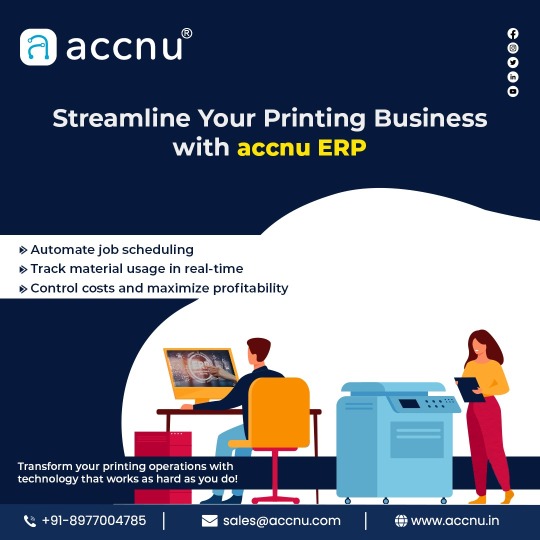
Transform your printing business with ACCNU, the leading ERP software for printing services. Automate job scheduling, track material usage in real-time, and control costs to maximize profitability. Recognized as the best ERP provider for printing services, ACCNU delivers trusted ERP solutions tailored to your needs. From streamlining operations to enhancing productivity, our ERP system ensures seamless workflows. As a top ERP partner for printing services, ACCNU provides the best ERP solutions and software to drive growth and efficiency. Choose ACCNU for the best ERP software for printing services!
https://accnu.in/
#erp software for Printing Services#Best erp for Printing Services#Leading erp for Printing Services#Best Software for Printing Services#ERP Services for Printing Services#ERP solutions for Printing Services#ERP partner for Printing Services#Trusted ERP Solutions for Printing Services#Best ERP software for Printing Services#Best ERP System for Printing Services#Best ERP Provider For Printing Services#erp software Printing Services#erp Printing Services software#Printing Services erp software#Top erp software for Printing Services#erp software Printing Services company
0 notes
Text
Why Waste Time? Leading ERP Solution Provider - ACCNU
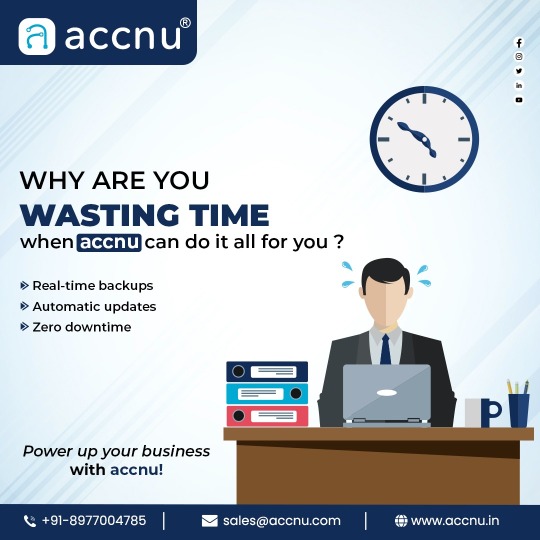
Why waste time when ACCNU, Hyderabad’s top ERP provider, can do it all for you? Offering real-time backups, automatic updates, and zero downtime, ACCNU delivers cloud-based ERP solutions designed to streamline operations, enhance productivity, and drive growth. As a trusted ERP partner and the #1 cloud-based ERP system provider, ACCNU ensures your business stays efficient and competitive. Power up your business with ACCNU’s best ERP solutions and services. Contact us today at +91-8977004785 or [email protected] to experience the difference with the leading ERP solution provider.
https://accnu.in/
#BestERPSolution#ERPSolutionProvider#ERPPartner#ERPSolutions#ERPServices#LeadingERPSolutionProvider#1CloudbasedERPSoftware#1CloudbasedERPSystem#ERPServicesandSolutions#ERPServicesprovider#BestERPSolutionprovider#BestERPPartner#BestERPservicesprovider
0 notes
Text
Think Smart, Think ACCNU ERP | Best ERP Solution Provider
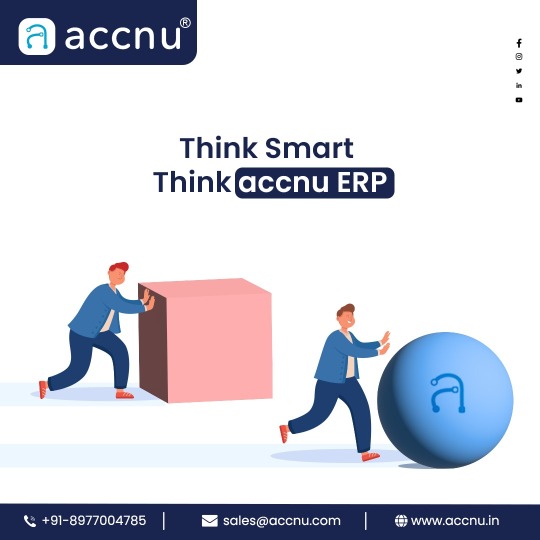
ACCNU empowers businesses to achieve digital transformation with the Best ERP Solution and cutting-edge cloud-based ERP software. As a leading ERP solution provider and your trusted ERP partner, we offer customized ERP services and solutions to enhance productivity and streamline operations. Recognized as the #1 cloud-based ERP system, our comprehensive ERP services are tailored to meet your unique needs. Partner with the best ERP solution provider to leverage advanced technology, seamless integration, and strategic success. Discover how ACCNU, the best ERP partner and ERP services provider, can drive your business toward efficiency and growth.
https://accnu.in/
#BestERPSolution#ERPSolutionProvider#ERPPartner#ERPSolutions#ERPServices#LeadingERPSolutionProvider#1CloudbasedERPSoftware#1CloudbasedERPSystem#ERPServicesandSolutions#ERPServicesprovider#BestERPSolutionprovider#BestERPPartner#BestERPservicesprovider
0 notes
Text
Financial Management Strategies Using ERP Software

Effective financial management is key to business success, and ERP software can transform how companies handle their finances. By automating processes like budgeting, cash flow management, and expense tracking, ERP systems minimize human errors and inefficiencies. They also offer real-time insights, enabling better decision-making and ensuring compliance with industry regulations. ERP software integrates financial functions across departments, providing a holistic view of the organization’s financial health. Discover how ERP can optimize your financial management strategies. For more details, read our blog.
#Best ERP Solution#ERP Solution Provider#ERP Partner#ERP Solutions#ERP Services#Leading ERP Solution Provider#1 Cloud based ERP Software#1 Cloud based ERP System#ERP Services and Solutions#ERP Services provider#Best ERP Solution provider#Best ERP Partner#Best ERP services provider
0 notes
Text
How ERP Helps Wholesale and Distribution Businesses Scale Efficiently

In today’s fast-paced business environment, wholesale and distribution businesses face numerous operational challenges to remain competitive and meet customer demands. With increasing market complexities, businesses are continuously seeking ways to optimize their operations, reduce costs, and scale efficiently. One of the most effective tools for achieving these goals is ERP software for wholesale and distribution. By integrating various business processes into a single platform, ERP system enable businesses to streamline operations, improve decision-making, and enhance productivity. Why ERP is Essential for Scaling Wholesale and Distribution Businesses For deep understanding read our Blog
#erp software for WholeSale And Distribution industry#Best erp for WholeSale And Distribution#erp software for WholeSale And Distribution#Leading erp for WholeSale And Distribution#Best Software for WholeSale And Distribution#ERP Services for WholeSale And Distribution#ERP solutions for WholeSale And Distribution#ERP partner for WholeSale And Distribution#Trusted ERP Solutions for WholeSale And Distribution#Best ERP software for WholeSale And Distribution#Best ERP System for WholeSale And Distribution#Best ERP Provider For WholeSale And Distribution#erp software WholeSale And Distribution#erpWholeSale And Distribution software#WholeSale And Distribution erp software#Top erp software for WholeSale And Distribution#erp software WholeSale And Distribution company
0 notes
Text
Data Import/Export: Best Practices for ERP Integration

In today’s digital landscape, effective data management is vital for organizations seeking to leverage their information assets for strategic decision-making. Enterprise Resource Planning (ERP) systems are designed to consolidate various business processes into a unified framework, but their effectiveness hinges on the quality of data imported and exported. This blog delves into the best practices for data import/export in ERP integration, highlighting the importance of clean data, proper mapping, and automation to ensure successful ERP implementation and operation.
Understanding Data Import and Export in ERP Systems Data Import involves transferring data from external sources into the ERP system. This can include importing data from legacy systems, spreadsheets, or other databases. Conversely, Data Export involves extracting data from the ERP system for reporting, analysis, or integration with other systems. Both processes are essential for maintaining accurate records, ensuring compliance, and supporting informed decision-making. For detailed understanding read our Blog
#Best ERP Solution#ERP Solution Provider#ERP Partner#ERP Solutions#ERP Services#Leading ERP Solution Provider#1 Cloud based ERP Software#1 Cloud based ERP System#ERP Services and Solutions#ERP Services provider#Best ERP Solution provider#Best ERP Partner#Best ERP services provider
0 notes
Text
ERP for Distributors in the FMCG Industry: A Game-Changer for Efficiency and Growth

In the dynamic world of the Fast-Moving Consumer Goods (FMCG) industry, distributors are pivotal in ensuring that products are efficiently managed and delivered from manufacturers to retailers. As the industry continues to evolve with changing consumer preferences and supply chain complexities, the need for an effective Enterprise Resource Planning (ERP) system has become more pronounced. ERP for distributors in the FMCG industry is not just a tool but a strategic asset that can drive efficiency, enhance decision-making, and support business growth. Here’s why ERP is essential for FMCG distributors and how it transforms their operations.
FOR MORE DETAIL READ OUR BLOG
#Best ERP Solution#ERP Solution Provider#ERP Partner#ERP Solutions#ERP Services#Leading ERP Solution Provider#1 Cloud based ERP Software#1 Cloud based ERP System#ERP Services and Solutions#ERP Services provider#Best ERP Solution provider#Best ERP Partner#Best ERP services provider
0 notes
Text
Production Management: Optimizing Manufacturing Processes

In the dynamic landscape of manufacturing, production management plays a pivotal role in ensuring that operations run smoothly, efficiently, and cost-effectively. As industries evolve and competition intensifies, manufacturers must adopt strategies to optimize their production processes. Effective production management not only streamlines operations but also enhances product quality, reduces waste, and improves overall profitability. This blog delves into the technical aspects of production management, focusing on how to optimize manufacturing processes through strategic planning, technology integration, and continuous improvement. For better understanding read our Blog
#ERP Software for Manufacturing Industry#Best erp for Manufacturing Industry#ERP solution for Manufacturing Industry#Leading ERP for Manufacturing Industry#Best Software for Manufacturing Industry#ERP Services for Manufacturing Industry#ERP solutions for Manufacturing Industry#ERP partner for Manufacturing Industry#Trusted ERP Solutions for Manufacturing Industry#Best ERP software for Manufacturing Industry#Best ERP System for Manufacturing Industry#Best ERP Provider For Manufacturing Industry#erp software manufacturing#erp manufacturing software#manufacturing erp software#Top erp software for manufacturing#erp software manufacturing company
0 notes
Text
How ERP Enables End-to-End Automation for Better Efficiency
The blog says that in today’s fast-paced business environment, achieving efficiency is crucial for companies that want to stay ahead of the competition. With continuous pressure to optimize operations, reduce costs, and boost productivity, businesses need to rethink their processes and adopt innovative solutions. One of the most effective ways to accomplish this is by implementing an Enterprise Resource Planning (ERP) system. ERP systems act as comprehensive platforms that integrate multiple business functions—such as finance, human resources, supply chain management, customer relationship management, and manufacturing—into a unified system. This integration enables seamless communication and data sharing across different departments, helping to eliminate the traditional silos that can hinder collaboration and decision-making.
Key topics covered include:
1.Understanding ERP Systems: The blog explains what ERP is and outlines its key features, including integration, real-time data processing, automation, scalability, and advanced analytics.
2.Importance of Automation: Automation is presented as a vital component in modern business, contributing to increased productivity, cost reduction, accuracy, faster response times, and improved compliance.
3.Enabling End-to-End Automation: The blog discusses how ERP systems automate various processes across procurement, inventory management, manufacturing, sales, finance, and human resources, leading to streamlined workflows and enhanced collaboration.
4.Data-Driven Decision Making: With real-time analytics and the ability to track key performance indicators (KPIs), ERP systems enable businesses to make informed decisions and implement predictive analytics for future planning.
5.Benefits of Automation: The blog outlines the significant advantages of ERP-enabled automation, such as improved efficiency, cost savings, enhanced customer satisfaction, compliance, and scalability.
In conclusion, the blog asserts that as the business landscape evolves, leveraging ERP for end-to-end automation becomes not only a strategic advantage but a necessity for long-term success. By adopting ERP systems and following best practices, companies can streamline their operations, drive growth, and stay competitive. phone no:+91 90004 82706 +91 9573737308 Email:[email protected] Website: https://accnu.in/how-erp-drives-end-to-end-automation-for-enhanced-efficiency/
#Accnu#AccnuERP#ERPPartner#ERPSoftware#ERPProvider#CloudBasedERP#CloudBasedSolutions#SMBs#ERPSolutions#AccnuERPforSMBs
0 notes